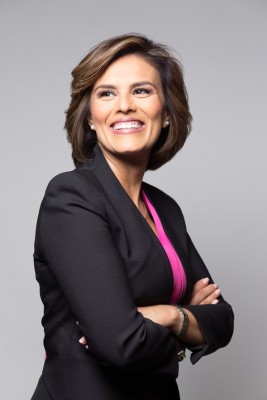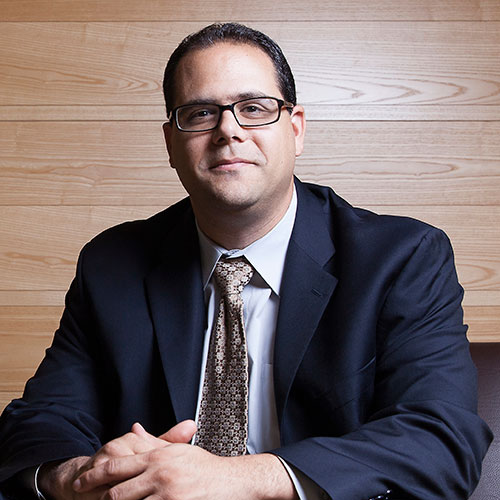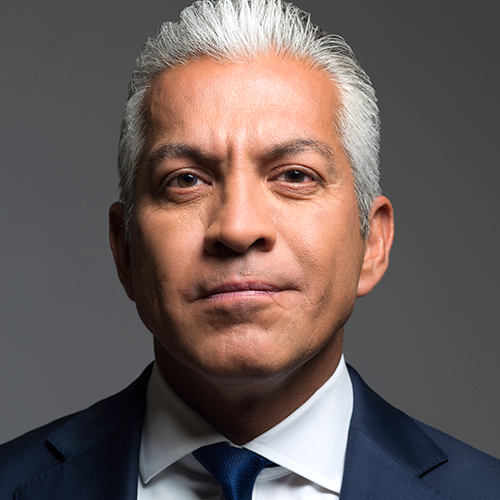
Photo by Sheila Barabad.
The predominantly Latino Chicago neighborhood Pilsen has long been considered a “port of entry” for immigrants to the Midwest city. This was definitely true for Maria Sotelo’s family, who left their native Jalisco, Mexico, when she was just two years old. Sotelo’s parents were religious and worked hard to instill traditional family values in their four children, emphasizing the importance of integrity, hard work, and education. Sotelo’s work now completely revolves around those same pillars.
The mother of two may have begun her career in the banking industry, but when she transitioned into the nonprofit world, working with the St. Jude League, it didn’t surprise anyone. Sotelo was known for her passion for giving back to the community and now, as program officer for the Heritage Portfolio Initiative—a St. Jude League network of community development programs in high-poverty, urban neighborhoods in the US—she exercises that passion every day. Here, Sotelo talks to HE about the Heritage Portfolio Initiative, the Latino Legacies film program, and why St. Jude’s work is so important to the city of Chicago.
HE: Why were you drawn to working with St. Jude League?
I grew up facing similar struggles affecting families that the St. Jude League supports. I learned how important it was for people to believe in me; to have mentors; to have people invest their time in me. The programs supported by the St. Jude League empower people in the community. Seeing the impact of those programs truly inspires me and makes me feel honored to be a part of their team.
Tell me about the Heritage Portfolio Initiative (HPI) department of the League.
Heritage Portfolio is a department comprised of two main programs: Latino Legacies and the Claretian Initiative (tCI). The purpose of tCI is to help maintain a variety of programs around the country that help underserved Latino communities: programs like tutoring, violence prevention, and youth outreach.
Latino Legacies is a short-form documentary film series featuring highly successful Latino role models that kids can relate to. The objective of this series is to inspire and motivate the youth in underserved and at-risk communities with role models who have successfully overcome similar challenges reaching their goals and objectives. HPI is the umbrella department under which all these programs operate.
Latino Legacies launched in 2014. Where are you with it?
The first pilot is done and the response has been overwhelmingly positive. We have found that the film has been inspirational to more than just children—their parents and other adults in their lives have found the film to be moving as well.
We are currently in the process of sourcing funds for future films as well as identifying new candidates to feature in the films. Production costs for the films are underwritten by private and corporate entities. Our goal is to make four to five films per series, as we continue to build this library of Latino role models.
Personally, why do you find the work inspiring?
I’m inspired by the potential impact that these films can have on children and the hope that these films can instill in anyone who watches them. The notion that children can drive their own lives by the choices they make every day; that someone can potentially see themselves in one of the films and maybe envision a different future for themselves, a future that they may not have seen possible before viewing the film. We’re telling stories that these kids would probably not hear otherwise. We’re creating an awareness of people they don’t get to engage with every day, an awareness that they have options in life.
What are the biggest challenges you face in doing your work, especially when it comes to pushing Latino Legacies forward?
We’re excited about the reaction and the feedback we’ve received thus far. Now the challenge is connecting with companies and potential investors who are just as passionate about empowering children, companies and investors who see the value in transforming communities and seeing them succeed. The funding model is a sponsorship model, with full credits for the sponsorship to enable each film to be made. Any funds we get are directly funneled into making more films and making the films accessible to these kids. We want every screening to be free for organizations—schools, community centers, libraries, parishes—without high-speed Internet access. We will donate the series on flash drives. There is no cost to anyone or any organization wanting to screen the series. We want as many Hispanic students to see the films as possible, in every part of the country.
In terms of your work with St. Jude League, what are you most proud of?
I am most proud of the fact that all the work we do is done with integrity. I’m referring to the entire organization, not just my colleagues or my department. We are driven by a genuine care for the children. I am proud of the authentic commitment to help families in need and to be part of a team that cares about not only the immediate welfare of these families, but their sustained success.

